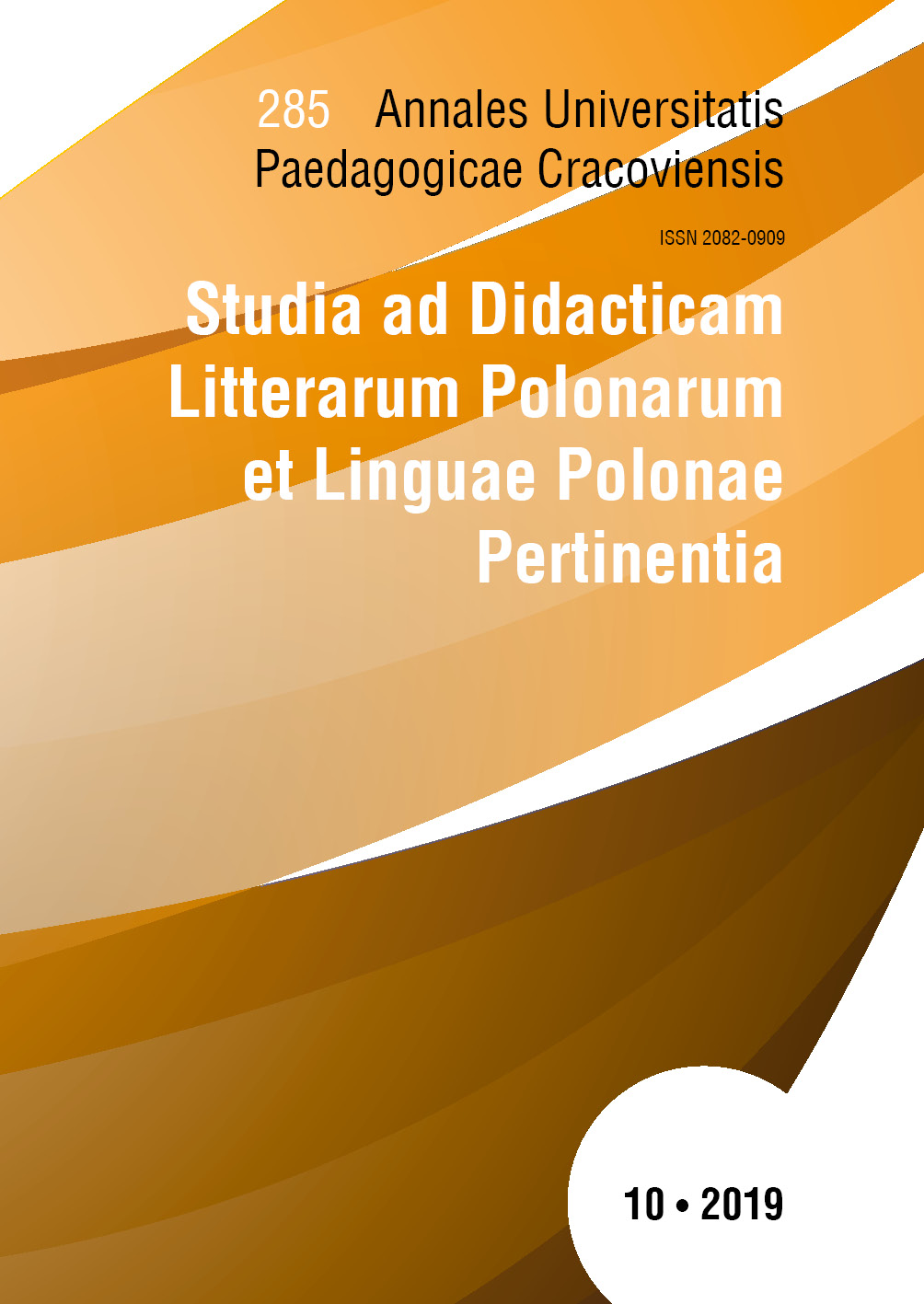Abstract
The article aims to answer two questions: how the language instruction framework was inscribed into the 2017/2018 Polish language curriculum and what image of the linguistic and communicative competence results from this document. The research method is based on the assumption that these two questions can be answered by analysing the cognitive operators used in the description of specific requirements. The article analyses the operators found in the ‘language instruction’ section of the curriculum. Within the linguistic and communicative competence, the document distinguishes among metalinguistic, analytical, linguistic (including normative and grammar-lexical competences) and communicative competences. Each competence has been ascribed with a group of operational verbs. Quantitative data presenting the distribution of specific requirements among these categories has also been included. The resulting image of a 6th grade graduate is one of a language expert, with functional and cognitive knowledge of language, able to analyse the language on various levels of its structure and use it correctly in speech and writing - these three competences account for 80% of all specific requirements. The remaining part is more or less linked to language use. Since the analysis encompasses only grades 4 to 6 of primary school, its conclusions are considered as research hypotheses.References
Bakuła K., Kształcenie językowe w szkole podstawowej w świetle współczesnych teorii psycholingwistycznych
i lingwistycznych. Projekt nowej metodyki, Wrocław 1997.
Europejski system opisu kształcenia językowego: uczenie się, nauczanie, ocenianie, red.
H. Komorowska, Warszawa 2003.
Galloway Ch., Psychologia uczenia się i nauczania, t. I, Warszawa 1988.
Grabias S., Język w zachowaniach społecznych, Lublin 1994.
Koc K., Funkcje wiedzy językoznawczej, [w:] Innowacje i metody. W kręgu teorii i praktyki,
red. M. Kwiatkowska-Ratajczak, Poznań 2011.
Kowalikowa J., Kształcenie językowe. Teoria dla praktyki, [w:] Polonista w szkole. Podstawy
kształcenia nauczyciela polonisty, red. A. Janus-Sitarz, Kraków 2004.
Nagajowa M., Kształcenie języka ucznia w szkole podstawowej, Warszawa 1985.
Nagajowa M., Nauka o języku dla nauki języka, Kielce 1994.
Nocoń J., Lingwodydaktyka na progu XXI wieku. Konteksty - koncepcje - dylematy, Opole
2018.
Patrzałek T., „Gramatyka” na cenzurowanym, [w:] Kompetencje szkolnego polonisty, red.
B. Chrząstowska, Warszawa 1995.
Polakowski J., Idea dydaktyki podmiotowej w podstawowych problemach kształcenia literackiego
(nurt antropocentryczno-kulturowy), [w:] Podmiotowy wymiar szkolnej
polonistyki, red. Z. Uryga, Kraków 1998.
Synowiec H., O sytuacji języka ojczystego w zreformowanej szkole, [w:] Kompetencje nauczyciela
polonisty we współczesnej szkole, red. E. Bańkowska, A. Mikołajczuk, Warszawa
2006.
Żydek-Bednarczuk U., Nowe aspekty kompetencji komunikacyjnej, [w:] W troskę o dobrą
edukację, red. H. Synowiec, Katowice 2009.
i lingwistycznych. Projekt nowej metodyki, Wrocław 1997.
Europejski system opisu kształcenia językowego: uczenie się, nauczanie, ocenianie, red.
H. Komorowska, Warszawa 2003.
Galloway Ch., Psychologia uczenia się i nauczania, t. I, Warszawa 1988.
Grabias S., Język w zachowaniach społecznych, Lublin 1994.
Koc K., Funkcje wiedzy językoznawczej, [w:] Innowacje i metody. W kręgu teorii i praktyki,
red. M. Kwiatkowska-Ratajczak, Poznań 2011.
Kowalikowa J., Kształcenie językowe. Teoria dla praktyki, [w:] Polonista w szkole. Podstawy
kształcenia nauczyciela polonisty, red. A. Janus-Sitarz, Kraków 2004.
Nagajowa M., Kształcenie języka ucznia w szkole podstawowej, Warszawa 1985.
Nagajowa M., Nauka o języku dla nauki języka, Kielce 1994.
Nocoń J., Lingwodydaktyka na progu XXI wieku. Konteksty - koncepcje - dylematy, Opole
2018.
Patrzałek T., „Gramatyka” na cenzurowanym, [w:] Kompetencje szkolnego polonisty, red.
B. Chrząstowska, Warszawa 1995.
Polakowski J., Idea dydaktyki podmiotowej w podstawowych problemach kształcenia literackiego
(nurt antropocentryczno-kulturowy), [w:] Podmiotowy wymiar szkolnej
polonistyki, red. Z. Uryga, Kraków 1998.
Synowiec H., O sytuacji języka ojczystego w zreformowanej szkole, [w:] Kompetencje nauczyciela
polonisty we współczesnej szkole, red. E. Bańkowska, A. Mikołajczuk, Warszawa
2006.
Żydek-Bednarczuk U., Nowe aspekty kompetencji komunikacyjnej, [w:] W troskę o dobrą
edukację, red. H. Synowiec, Katowice 2009.
Downloads
Download data is not yet available.

